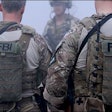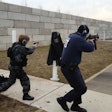With NFL training camps opening nationwide this month. I thought it would be fun to compare and contrast our two favorite team “sports.”
On the surface, it would seem that pro football teams and SWAT teams are totally unrelated. After all, NFL football is only a game, and its players are among the highest paid people in America. Whereas pay is definitely not the primary reason that any of us chose law enforcement as our profession, and our life and death operations in SWAT are by no means a game.
However, underneath the surface and beyond these differences, pro football and SWAT share very similar traits. What follows is a brief overview of the similarities and differences between pro football and SWAT.
First let’s look at the similarities:
• Both the NFL and SWAT are considered to be the pinnacle of their respective professions. Only a select few football players ever reach the NFL. And only a select few cops ever make it as SWAT officers. Competition to reach these pinnacles and stay on a team is fierce.
• Both football players and SWAT officers “play” a violent contact/collision “sport,” where injuries and risks are expected and common, too often ending promising careers. Physical fitness and strength are so prized that diminished skills can get you dropped from a team.
• Both SWAT officers and pro football players train incessantly, constantly honing both their strategies, tactics, techniques, and skills to a razor sharp edge.
• Both know that winning is the ultimate goal of the game. Only when pro football teams lose a game or season, there’s always the next game and the next season. SWAT can never afford to lose even a single “game.” Because losing means people (innocent persons or police) die.
• Both football and SWAT involve certain basic strategies, tactics, techniques, and skills, which must be constantly honed to a razor sharp edge, ready for the next scheduled or unscheduled game, which can, and does, occur at any time and place.
• Regardless of position or talent, pro football players constantly drill the basics of tackling, blocking, throwing, receiving, running, kicking, etc. All pro teams put in endless hours of repetitive individual and team drills because everyone understands the importance of getting the basics right. SWAT also constantly drills individual and team basics: movement, cover/concealment, shooting, entries, searching, chemical/less-lethal, medevac, and so on. All SWAT teams also understand the importance of getting the basics right, regardless of specialty, skill level, or experience.
• Imagine a pro football player who tells the coach he no longer needs to practice or workout because he’s the “best” and knows all there is to know. It rarely happens because great athletes know that their skills—both individual and team—are perishable, and will diminish, if they don’t keep them tuned. It’s the exact same with SWAT officers, who must constantly work hard to keep their skill levels high enough to win every game against every opponent.
• Both pro football teams and SWAT teams place great emphasis on winning and are willing to make many sacrifices along the road to becoming winners. Individual “stars” defer and contribute to the team because all winners understand that teams, not individuals, are the real key to victory.
• Winning football coaches and SWAT commanders/team commanders understand how to build their teams into well-oiled successful machines, clicking together on all cylinders. Successful coaches understand the dynamics of competition and that every team in the league is working hard to become the best. SWAT commanders are no different; they know that their future opponents are sharpening their skills and studying tactics with a single goal in mind: to defeat SWAT. (If you don’t think this is so, talk to some COs. They will tell you how the bad guys are training to beat you while doing time in prisons and jails.)
Now let’s look at some major differences between SWAT ops and football.
• NFL football is played on the same size field by 11 players on the field, games last 60 minutes with timeouts and halftime breaks built in, and the object is to score more points than your opponent. SWAT “games” can last anywhere from only minutes, to hours, and even days, against a single opponent or as many as dozens. They are always played on the opponent’s field, often in front of hostile “fans.” These fields can be apartments, houses, large buildings, vehicles, open fields, rugged outdoor areas, etc. There is never a home field advantage for SWAT. And the only object is to end the incident without any innocent loss of life and preferably no guilty loss of life.
• Football seasons start and end at the same time for all teams—from training camp in July, to preseason, regular season, postseason, and finally the Super Bowl in early February. SWAT’s “season” is year round, with no set number of games, with some teams playing less than 10 “games” and other busy teams playing as many as 1,000.
• Also, unlike football, the “rules” vary from one jurisdiction to another for SWAT teams and are constantly changing, oftentimes during the middle of a game. But only the SWAT side must play by the rules against opponents who have no such restrictions.
As NFL training camps open this month, take a fresh look at your favorite team. What changes were made in off-season? What are the plans for training camp and preseason? What are the expectations for regular season and postseason success? The goal of every NFL team is the same: to win the Super Bowl. However, only one team can win it, and all of the others must “wait until next year.”
Every day is the season for SWAT, and every game is the “Super Bowl.” However, we can learn much from how pro football teams prepare for and play their games. We can also learn a lot about teamwork by observing why the Browns, Cowboys, Bears, Chargers, etc. win and lose and how they work to improve their on-field performance.
Remember the ultimate truth of SWAT: “When you aren’t practicing, someone else is, and when you meet him, he will win.”












